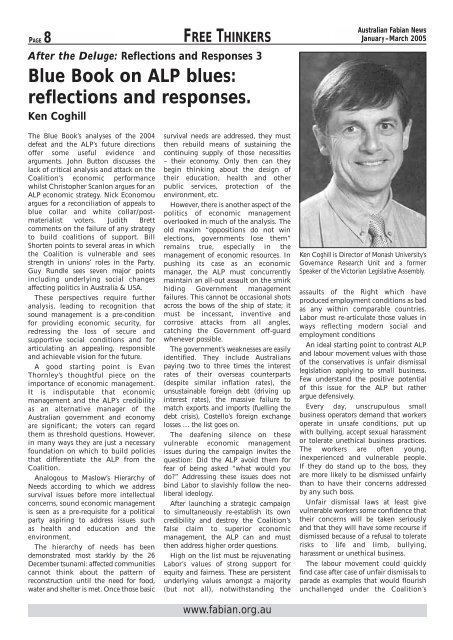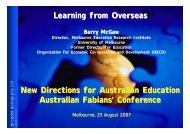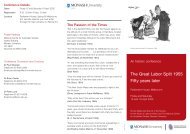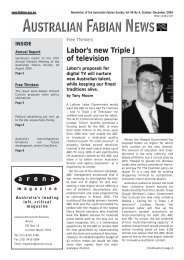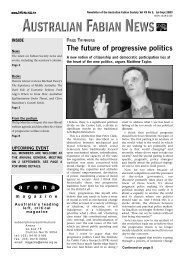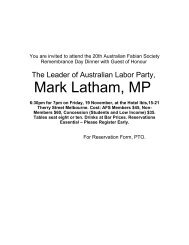Vol 45 No 1 - Australian Fabian Society
Vol 45 No 1 - Australian Fabian Society
Vol 45 No 1 - Australian Fabian Society
Create successful ePaper yourself
Turn your PDF publications into a flip-book with our unique Google optimized e-Paper software.
PAGE 8FREE THINKERSAfter the Deluge: Reflections and Responses 3Blue Book on ALP blues:reflections and responses.Ken Coghill<strong>Australian</strong> <strong>Fabian</strong> NewsJanuary–March 2005The Blue Book’s analyses of the 2004defeat and the ALP’s future directionsoffer some useful evidence andarguments. John Button discusses thelack of critical analysis and attack on theCoalition’s economic performancewhilst Christopher Scanlon argues for anALP economic strategy. Nick Economouargues for a reconciliation of appeals toblue collar and white collar/postmaterialistvoters. Judith Brettcomments on the failure of any strategyto build coalitions of support. BillShorten points to several areas in whichthe Coalition is vulnerable and seesstrength in unions’ roles in the Party.Guy Rundle sees seven major pointsincluding underlying social changesaffecting politics in Australia & USA.These perspectives require furtheranalysis, leading to recognition thatsound management is a pre-conditionfor providing economic security, forredressing the loss of secure andsupportive social conditions and forarticulating an appealing, responsibleand achievable vision for the future.A good starting point is EvanThornley’s thoughtful piece on theimportance of economic management.It is indisputable that economicmanagement and the ALP’s credibilityas an alternative manager of the<strong>Australian</strong> government and economyare significant; the voters can regardthem as threshold questions. However,in many ways they are just a necessaryfoundation on which to build policiesthat differentiate the ALP from theCoalition.Analogous to Maslow’s Hierarchy ofNeeds according to which we addresssurvival issues before more intellectualconcerns, sound economic managementis seen as a pre-requisite for a politicalparty aspiring to address issues suchas health and education and theenvironment.The hierarchy of needs has beendemonstrated most starkly by the 26December tsunami: affected communitiescannot think about the pattern ofreconstruction until the need for food,water and shelter is met. Once those basicsurvival needs are addressed, they mustthen rebuild means of sustaining thecontinuing supply of those necessities– their economy. Only then can theybegin thinking about the design oftheir education, health and otherpublic services, protection of theenvironment, etc.However, there is another aspect of thepolitics of economic managementoverlooked in much of the analysis. Theold maxim “oppositions do not winelections, governments lose them”remains true, especially in themanagement of economic resources. Inpushing its case as an economicmanager, the ALP must concurrentlymaintain an all-out assault on the smirkhiding Government managementfailures. This cannot be occasional shotsacross the bows of the ship of state; itmust be incessant, inventive andcorrosive attacks from all angles,catching the Government off-guardwhenever possible.The government’s weaknesses are easilyidentified. They include <strong>Australian</strong>spaying two to three times the interestrates of their overseas counterparts(despite similar inflation rates), theunsustainable foreign debt (driving upinterest rates), the massive failure tomatch exports and imports (fuelling thedebt crisis), Costello’s foreign exchangelosses … the list goes on.The deafening silence on thesevulnerable economic managementissues during the campaign invites thequestion: Did the ALP avoid them forfear of being asked “what would youdo?” Addressing these issues does notbind Labor to slavishly follow the neoliberalideology.After launching a strategic campaignto simultaneously re-establish its owncredibility and destroy the Coalition’sfalse claim to superior economicmanagement, the ALP can and mustthen address higher order questions.High on the list must be rejuvenatingLabor’s values of strong support forequity and fairness. These are persistentunderlying values amongst a majority(but not all), notwithstanding thewww.fabian.org.auKen Coghill is Director of Monash University’sGovernance Research Unit and a formerSpeaker of the Victorian Legislative Assembly.assaults of the Right which haveproduced employment conditions as badas any within comparable countries.Labor must re-articulate those values inways reflecting modern social andemployment conditionsAn ideal starting point to contrast ALPand labour movement values with thoseof the conservatives is unfair dismissallegislation applying to small business.Few understand the positive potentialof this issue for the ALP but ratherargue defensively.Every day, unscrupulous smallbusiness operators demand that workersoperate in unsafe conditions, put upwith bullying, accept sexual harassmentor tolerate unethical business practices.The workers are often young,inexperienced and vulnerable people.If they do stand up to the boss, theyare more likely to be dismissed unfairlythan to have their concerns addressedby any such boss.Unfair dismissal laws at least givevulnerable workers some confidence thattheir concerns will be taken seriouslyand that they will have some recourse ifdismissed because of a refusal to toleraterisks to life and limb, bullying,harassment or unethical business.The labour movement could quicklyfind case after case of unfair dismissals toparade as examples that would flourishunchallenged under the Coalition’s


